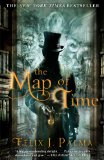Summary | Excerpt | Reviews | Beyond the Book | Readalikes | Genres & Themes | Author Bio

A Novel
by Felix J. Palma
Andrew had last made this journey eight years earlier, and since then he had always known that sooner or later he would make it again for the very last time. It was hardly surprising then that as they drew nearer to Aldgate, the gateway to Whitechapel, he felt slightly uneasy. He gazed warily out of the window as they entered the district, experiencing the same misgivings as he had in the past. He had never been able to avoid feeling overwhelmed by an uncomfortable sense of shame knowing that he was spying on what was to him an alien world with the dispassionate interest of somebody who studies insects. Over time, though, his initial revulsion had turned into inevitable compassion for the souls who inhabited that junkyard where the city dumped its human waste. And, peering out of the window, it seemed as if there was every reason for him to feel that compassion still: London's poorest borough had changed relatively little in the past eight years. Wealth brings poverty in its wake, thought Andrew, as they crossed the ill-lit, rowdy streets, crammed with stalls and handcarts and teeming with wretched creatures whose lives were played out beneath the menacing shadow of Christ Church. At first, he had been shocked to discover that behind the dazzle of the city's façade there existed this outpost of hell where, with the Queen's blessing, human beings were condemned to live like beasts. But the intervening years had made him less naÏve, so that he was no longer surprised to see that even as the advances of science were transforming the face of London and the well-to-do amused themselves by recording their dogs' barks onto the wax-coated cylinders of phonographs or conversed via telephone under the glow of Robertson's electric lamps, while their wives brought their children into the world still groggy from chloroform, Whitechapel had remained immune to all this progress, untouchable beneath its rotten shell, drowning in its own filth. A quick glance was enough to tell him that crossing into this world was still like sticking his hand into a hornets' nest. It was here that poverty showed its ugliest face, here that the same jarring, sinister tune was always playing. He observed a couple of pub brawls, heard screams rising from the depths of dark alleyways, and glimpsed a few drunks sprawled in the gutter while a gang of street urchins stripped them of their shoes. They exchanged glances with a pair of pugnacious-looking men standing on a street corner, the petty rulers in this parallel kingdom of vice and crime.
THE LUXURIOUS CARRIAGE CAUGHT the attention of several prostitutes who shouted lewd proposals to him, hitching up their skirts and showing their cleavage. Andrew felt a pang of sorrow as he gazed upon this pitiful back-street spectacle. Most of the women were filthy and downtrodden, their bodies bearing the mark of their daily burden. Even the youngest and prettiest could not escape being stained by the misery of their surroundings. He was revisited by the agonizing thought that he might have saved one of these doomed women, offered her a better life than the one her Creator had allotted her, and yet he had failed. His sorrow reached a crescendo as the carriage rattled past the Ten Bells, emitting an arpeggio of creaks as it turned into Crispin Street on its way to Dorset Street, passing in front of the Britannia pub where he had first spoken to Marie. This street was his final destination. Harold pulled the carriage up next to the stone arch leading to the Miller's Court flats, and climbed off the perch to open the carriage door. Andrew stepped out of the coach feeling suddenly dizzy and was aware that his legs were shaking as he looked around him. Everything was exactly as he remembered it, down to the shop with grimy windows run by McCarthy, the owner of the flats which stood beside the entrance. Nothing he saw indicated to him that time also passed in Whitechapel.
"You can go home now, Harold," he told the coachman, who was standing in silence at his side.
Excerpted from The Map of Time by Felix J Palma. Copyright © 2011 by Felix J Palma. Excerpted by permission of Atria Books. All rights reserved. No part of this excerpt may be reproduced or reprinted without permission in writing from the publisher.




A million monkeys...
Click Here to find out who said this, as well as discovering other famous literary quotes!
Your guide toexceptional books
BookBrowse seeks out and recommends the best in contemporary fiction and nonfiction—books that not only engage and entertain but also deepen our understanding of ourselves and the world around us.